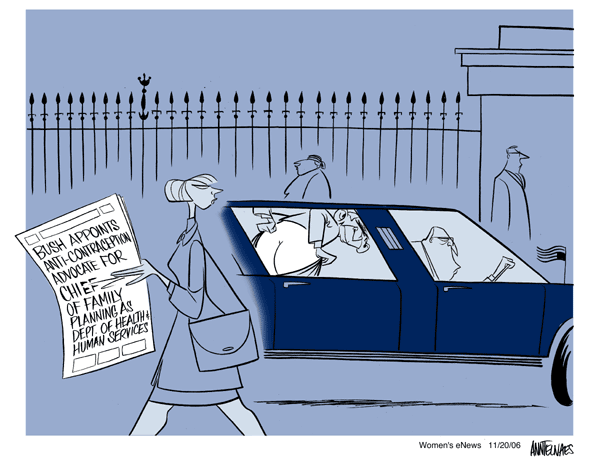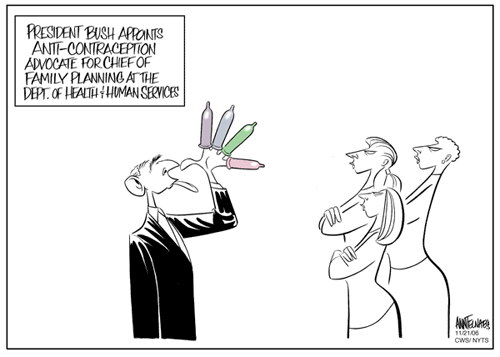[I submitted this article to Slate over the weekend, but they don't seem to be interested in it, so I bring it to you in more limited release.]
Last week, when George Allen yielded the Virginia Senate race to Jim Webb and handed the Senate to the Democrats, he threw in a Bible reference during his concession speech. As he thanked his family and supporters and provided some feel-good platitudes for the people of Virginia, he also cast his defeat in Biblical terms: "The Bible teaches us that there's a time and place for everything. And today, I've called and congratulated Jim Webb and his team for their victory. They had the prevailing winds." Allen was no doubt referring to the beginning of Ecclesiastes 3, which you may know as the song "Turn! Turn! Turn!" by the Byrds. The opening lines are familiar and relatively unremarkable: "To every thing there is a season, and a time to every purpose under heaven."
Allen isn't the first politician to use Ecclesiastes 3 on his way out the door. Back in March, when Andrew Card resigned as White House Chief of Staff, he began his speech with an even more explicit citation to the verse: "Mr. President, Ecclesiastes reminds us that there are different seasons, and there is a new season." In June 2005, when David Wilkins resigned from his 25-year stint in the South Carolina State Legislature to become the U.S. Ambassador to Canada, he dropped an Ecclesiastes 3 citation in referring to his replacement as Speaker of the House. Former California Attorney General Dan Lungren also recited the quote when he conceded the 1998 California Governor's race to Gray Davis (though the time for Gray Davis would be cut short).
Using Ecclesiastes 3 in the context of resigning or conceding isn't exactly routine practice, but it's common enough to be noticed. So, why does the Bible's pronouncement that everything has its time keep showing up to usher politicians out? Here are a few theories.
First off, it's a relatively safe Bible citation. As a repository of the wisdom of King Solomon, Ecclesiastes 3 is philosophical rather than dogmatic. In fact, it's the opposite of dogma. How can you make rules out of alwayses and nevers when there's a time for everything? Indeed, Ecclesiastes 3 borders on the existential. As such, conservative politicians trying to stay friendly with moderates (like Allen with his long-fabled and still-possible presidential bid) can quote from it without sounding like a true Bible-thumper. Dropping a platitude like "stuff happens all the time" and linking it to the Bible is a way of showing familiarity with and respect for the Good Book without showcasing one's adherence to its doctrinal law. This, no doubt, makes it attractive for right-of-center politicians.
The verse's safety is further enhanced by its ambiguity. In a certain sense, Ecclesiastes quoters might be saying "God has a plan" without using the Bible passages that make this point a little more finely (like Proverbs 16:33: "The lot is cast into the lap; but the whole disposing thereof is of the Lord."). This is a valid interpretation for more divine-minded listeners, while other audience members may pick up on the existential interpretation. Importantly, its use as a throw-away rhetorical flourish frees the speaker from committing to one interpretation or another.
In addition, Ecclesiastes 3 absolves the speaker of responsibility. Jim Webb's camp won the Virginia Senate race because "They had the prevailing winds." Not because the voters didn't like Allen's stance on the issues, not because Webb ran a better campaign, and certainly not because of Allen's "Macaca" moment. No, Allen was just a victim to the winds of change, against mere mortals are powerless. Invoking Ecclesiastes 3 absolves politicians of blame for losing elections or being forced out of jobs.
Finally, using Ecclesiastes 3 lets the speaker take a subtle swipe at the new guy. The lines following the opening of Ecclesiastes 3, (those that make up the verses of the Byrds song rather than the chorus) make it clear that the more specific point of the verse is that there is a time for good things and bad things. A time to love, a time to hate. A time to be born, a time to die. A time to kill, a time to heal. Presumably, the smiley-face times happened while the politician was still in office, and the lousy times are about to begin now that he's leaving. Put more concretely, Allen was telling the people of Virginia that, now that Jim Webb is representing them, they'd better get ready for tearing down, weeping, and refraining from embraces. Given the requisite graciousness and magnanimity in giving up one's seat of power, it's nice to be able to slip in a Biblical dig at whoever forced you out.




